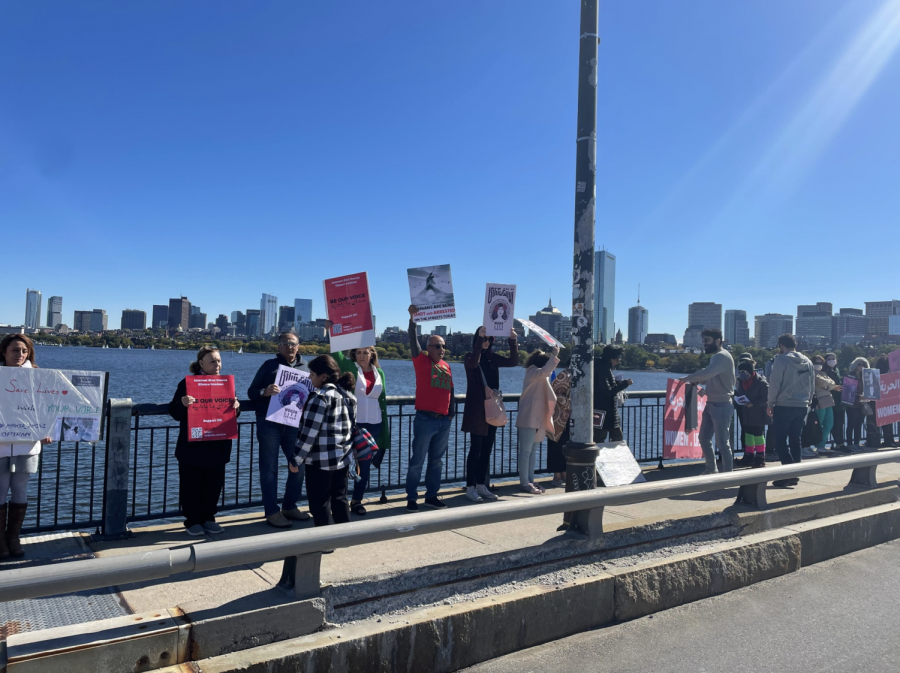Boston protesters take to Harvard Bridge over death of Mahsa Amini
A crowd gathers with signs at the Harvard Bridge Oct. 8, protesting the death of Mahsa Amini. The 22-year-old died in custody of the Iranian morality police Sept. 16.
October 21, 2022
“From Boston to Tehran, end the regime in Iran!”
This was just one of the many chants called out at Harvard Bridge Oct. 8 on the Global Day of Action for Iran. Protesters stretched across the bridge, forming a human chain.
Protests spread from Iran to countries including England, Russia and even neighboring Afghanistan over the Sept. 16 death of 22-year-old Kurdish woman Mahsa “Jina” Amini while she was in the custody of Iranian morality police. The cause of her arrest was her hijab, which police said was improperly worn. Since her death, she has become a symbol for Iranian repression and a rallying cry for Iranian women tired of the Islamic Republic’s regime.
Throughout the protest, event organizers carried megaphones and led chants, such as “Women, life, freedom,” and “Say her name: Mahsa Amini.”
Protests, even in the United States, are not without risk for Iranian citizens. Many wore sunglasses, hoodies and masks for fear of being identified.
Protester Marjan Monfared, an Iranian native and infrastructure planning engineer at Black & Veatch in Boston, explained why Amini’s death has caused such a powerful uproar.
“[Amini] did nothing. She was obeying all the rules. She was all covered up. [The morality police] want to spread fear, so [arrests] are like a lottery. It happened to me. It could happen to anyone,” Monfared said. “That day was her turn. And it’s not just one single person, it’s hundreds of girls getting arrested every day.”
Monfared said she too was arrested by the morality police in Iran in 2012.
“I was a student in university and I had very long hair, so I was braiding it,” Monfared said. “A piece of braid was showing below my hijab, and the morality police grabbed my braid and pushed me into a van like a criminal. They humiliated me.”
When asked to describe the abuses of the Islamic Republic’s regime, Monfared faltered.
“I was trying to explain it to my American friends and my friends from other places, but it’s hard. It’s like you want me to describe a house of spiderwebs. You can’t just go on the surface,” Monfared said. “For the last 44 years, they’ve been doing mass executions. You cannot cover all the crimes of this regime in an hour or two hours. They’ve been happening since the [Iranian] revolution in [1978].”
Stressing the complexity of Iran, she described what she had learned of the regime’s history.
“It comes with layers, like how they started oppressing women at the beginning. They silenced women. But in our generation, women have started to be educated and make their own lives. At its face, it’s like [Iran] is a democracy, but it’s not,” Monfared said. “No votes have any effect on the whole system. And it’s all anti-women — a woman doesn’t have any rights.”
Monfared said she especially believes that Americans should not support the new Iran Nuclear Deal, whose negotiations have been underway for over a year.
“[The United States government] will pay money to the Iran regime to lift the sanctions and give oil to the U.S. If [the nuclear deal] happens, Americans will heat up their homes, not with oil, but with Iranian blood,” Monfared said.
She made an impassioned plea to American citizens, asking them to use their vote to support Iran.
“Vote deadlines are in November. You didn’t do [this nuclear deal] for many years — don’t do it now,” Monfared said. “Don’t feed this regime with money. Its corruption is so systematic.”
Americans have also joined protests in support of Iran. One American protester, Harvard poetry curator and Cambridge resident Christina Davis, said that by protesting, she felt she could support the women of Iran while learning more deeply about the issues.
“I wanted to have a more immersive experience than simply reading about it online, to understand what’s actually transpiring in Iran,” Davis said. “I’ve already learned a great deal through the conversations I’ve had here. And, it’s been particularly moving to realize that — despite our failures here in the U.S. in terms of civil rights and equality — the movements that have sought to address them, such as Black Lives Matter and #MeToo, have provided powerful models and chants for Iranian protesters to integrate and adapt. It will be interesting to see how we, as U.S. activists, in turn learn from the Iranian uprising to further social justice here.”
Some students at Northeastern University are closely following the protests in Boston and hoping that action in the United States will lead to change abroad, including Iranian native and first-year computer science and mathematics major Armina Parvaresh Rizi.
“I heard about [the protest] from my extended family, as they were experiencing the distress firsthand,” Rizi said. “I feel like everyone should have the right to express themselves freely, whether that’s the choice of wearing a hijab or not.”
Monfared said she hopes the women of Iran are depicted as free, authoritative agents by the American press.
“We are not an apparatus to the regime,” Monfared said. “We are not an apparatus to the government. We are women. We are powerful. We have the wisdom to know what is right for us.”







